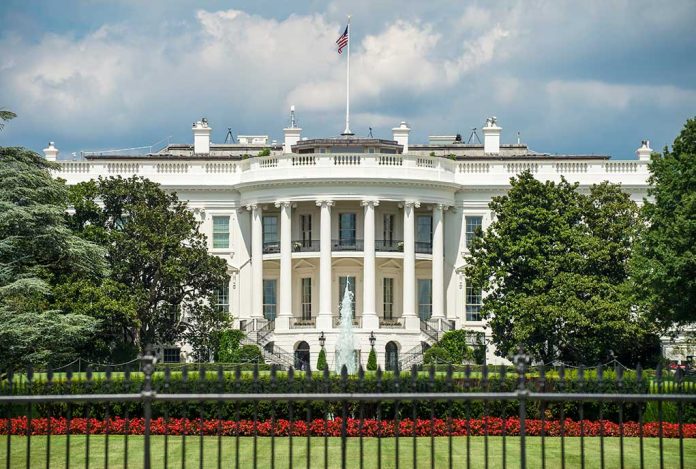
Did Trump’s decision to exclude the Associated Press from the Oval Office set a dangerous precedent for press freedom?
Key Takeaways
- The Associated Press was barred from an Oval Office event for refusing to use “Gulf of America” instead of “Gulf of Mexico.”
- Critics argue this move poses a threat to First Amendment rights and journalistic freedom.
- The Freedom of the Press Foundation and White House Correspondents’ Association condemned this decision.
- AP continues to use globally-standard geographical terminology in its reporting.
Exclusion Sparks Debate
The Trump administration’s decision to bar the Associated Press (AP) from an Oval Office event after they declined to adhere to President Trump’s mandate of referring to the Gulf of Mexico as the “Gulf of America” has raised significant concerns. Due to the AP’s refusal to compromise editorial standards, critics say this exclusion sets a worrying precedent for press freedom and the First Amendment rights, intensifying the debate on governmental transparency and censorship.
This development follows Trump’s executive order renaming the Gulf of Mexico, with various global repercussions, as some entities have recognized the change while others, like the AP, remain committed to international standards for clarity. The White House’s directive for adherence to the updated terminology and subsequent fallout with the AP underscores the fraught relationship between the current administration and the media.
Backlash from Press Freedom Groups
The Freedom of the Press Foundation severely criticized President Trump, stating that the exclusion of an AP reporter compromises journalistic autonomy. The White House Correspondents’ Association echoed these concerns, asserting that the White House should not dictate how news is reported nor penalize journalists for editorial decisions. These statements reflect broader apprehensions about potential viewpoint discrimination and the implications for constitutional freedoms.
The White House cannot dictate how news organizations report the news, nor should it penalize working journalists because it is unhappy with their editors’ decisions. The move by the administration to bar a reporter from The Associated Press from an official event open to news coverage today is unacceptable. – White House Correspondents’ Association
AP’s commitment to continue using “Gulf of Mexico” in their reports aligns with their goal for news clarity and global recognition. Despite the administration’s insistence, AP prioritizes accurate and widely-understood geographical names. This stance reflects the ongoing tension between journalistic independence and governmental pressure, a dynamic previously seen during past interactions between Trump and the press, such as the barring attempts against CNN’s Jim Acosta and Playboy’s Brian Karem.
Implications for the Future
The exclusion of the AP not only affected press coverage operations but, according to author James Surowiecki, represents a potential violation of First Amendment rights. Such incidents reiterate the administration’s contentious interactions with the media, sparking speculation about the future of press relations under government influence.
“It is alarming that the Trump administration would punish AP for its independent journalism. Limiting our access to the Oval Office based on the content of AP’s speech not only severely impedes the public’s access to independent news, it plainly violates the First Amendment.” – Julie Pace
As the AP maintains its editorial integrity, discussions on editorial freedom and governmental authority in nomenclature continue. While the conflict may seem concentrated, its ripple effects could influence future administrations’ approaches to media relations and press access.
Sources
1. Press Freedom Group Rips Trump Banning Reporter Over ‘Gulf of America’ Rule
2. Trump Bans A.P. From Oval Office for Not Saying ‘Gulf of America’




